History
History is the study of past events, particularly human affairs. It encompasses a wide range of subjects, including the development of civilizations, important figures and movements, and the impact of historical events on the present day.
Key Concepts in History
- Chronology: Understanding the order in which events occurred is crucial to studying history. This involves organizing events on a timeline and understanding how they relate to one another.
- Cause and Effect: History often involves examining the causes and effects of specific events or patterns of behavior. This helps us understand why things happened and their impact on the future.
- Primary and Secondary Sources: Historians rely on both primary sources (firsthand accounts, documents, artifacts) and secondary sources (interpretations and analyses of primary sources) to understand and interpret historical events.
- Historical Interpretation: Different historians may interpret the same events in different ways. Understanding these interpretations and their basis is an important aspect of historical study.
Study Guide
To effectively study history, consider the following tips:
- Develop a strong understanding of chronology and timelines to place historical events in context.
- Practice analyzing cause-and-effect relationships to understand the impact of historical events.
- Engage with primary sources, such as historical documents and artifacts, to gain a firsthand understanding of the past.
- Compare and contrast different historical interpretations to develop a well-rounded understanding of events and movements.
- Utilize visual aids such as maps, charts, and timelines to reinforce your understanding of historical events and their contexts.
- Consider the broader social, political, and economic contexts in which historical events occurred.
By incorporating these strategies into your study of history, you can develop a deeper understanding of the past and its impact on the present.
[History] Related Worksheets and Study Guides:
.◂Science Worksheets and Study Guides Fifth Grade. Energy resources
Study Guide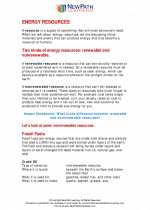 Energy resources
Energy resources  Worksheet/Answer key
Worksheet/Answer key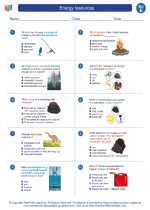 Energy resources
Energy resources  Worksheet/Answer key
Worksheet/Answer key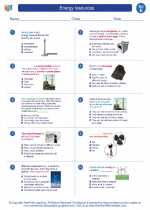 Energy resources
Energy resources  Worksheet/Answer key
Worksheet/Answer key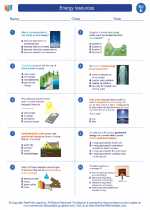 Energy resources
Energy resources  Vocabulary/Answer key
Vocabulary/Answer key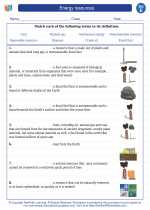 Energy resources
Energy resources  Vocabulary/Answer key
Vocabulary/Answer key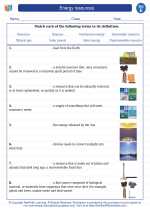 Energy resources
Energy resources 

 Worksheet/Answer key
Worksheet/Answer key
 Worksheet/Answer key
Worksheet/Answer key
 Worksheet/Answer key
Worksheet/Answer key
 Vocabulary/Answer key
Vocabulary/Answer key
 Vocabulary/Answer key
Vocabulary/Answer key

The resources above cover the following skills:
EARTH AND SPACE SCIENCE (NGSS)
Earth and Human Activity
Students who demonstrate understanding can:
Obtain and combine information about ways individual communities use science ideas to protect the Earth’s resources and environment.